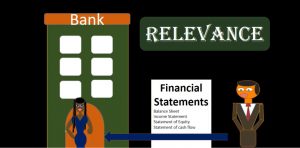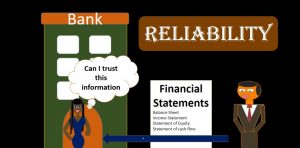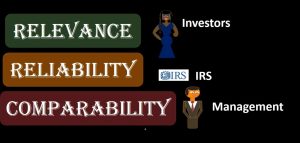Hello in this presentation we will discuss accounting objectives, objectives, including relevance reliability and compare ability objective, we will be able to at the end of this presentation, list accounting objectives and explain the reasons for accounting objectives. The accounting objectives will include relevance reliability and compare ability. If we take a look at these individually, we can see some more components within these objectives and the reasons for these objectives. But also note that as we look at these individually, they are related and many of the aspects of why we need relevance will also be related to reliability as well as compare ability.
00:45
We can take a look at the reasons for these objectives in a scenario format to remember that the financial statements are the end goal of the financial accounting and the end goal the financial statements need to be relevant reliable and comparable. The end users then are going to be the external users external users like investors, like a bank. In this case, we’re going to be considering a bank. So the scenario will be that the owner over here wants to get a loan from the bank. This is of course a business transaction in that the bank wants to provide the loan to the business if they believe that the business owner can repay the loan because the bank will then earn interest on the loan given however, the bank is skeptical is going to be skeptical as to whether the business owner will be able to repay the loan.
01:38
The business owner, of course, wants to receive the loan and is willing to pay a reasonable amount of interest on the loan in order to have the capital the cash at this point in time in order to keep their business going. This is a typical type of scenario. And the question is are these financial statements going to be relevant to the decision making process for the bank. So the bank is going to be deciding whether or not the financial statements will be something they can help to use in order to determine whether or not the business owner will be able to repay the loan.
02:14
Now, we would hope that the financial statements would be relevant in this case to the repayment of a loan the financial statements often being something that the business owner will ask or the bank will ask for when a loan is going to be granted, because the financial statements should give an idea of where the company stands the balance sheet as of a certain point of time, that should give us the income statement, what has happened over a certain point in time, as well as the statement of equity and the statement of cash flows what what is the net value from the beginning to the end and what is the cash flow from the beginning to the end? This we would assume would be relevant information when a bank is making the decision as to whether a loan should be given because That’ll give us some information based on where the company stands now and on past history, whether or not the company will be able to repay the loan.
03:10
Now, of course, in order for the, the bank to trust the financial statements, they’re also going to want to make sure that those numbers are correct. And they’re going to want to make sure that the numbers are timely, as well. We can’t have financial statements that are going to be too old to in the past, because that won’t be relevant to the current decision making process. So of course, the balance sheet tells us where we stand as of this point in time, the income statement, we’re probably going to go one to two years back possibly more than that, to tell the story of where we got to this point in time. Then we’ve got reliability. So we can think about this transaction.
03:50
We’re trying to get a loan, the bank’s trying to decide if we should get a loan. And the bank is basically asking, Can we trust these financial statements. So the idea of giving Given the financial statements to the bank, the bank’s gonna be questioning whether or not those numbers, these numbers just on paper can be trusted. A couple different things that the financial that the bank could do in order to have more trust in the financial statements. One is just the standardization of the financial statements.
04:18
So the fact that the financial statements are made in a standard format, we expect the balance sheet to be in the format of the balance sheet and the income statement to be in the format of the income statement is one thing that the bank could then use to have some security some assurance that the financial statements are correct. We are they also may ask for financial statements to be specifically in accordance with a specific standard, such as generally accepted accounting principles. And therefore we would have even more reliance that the financial statements at least are claiming to be in the format of generally accepted accounting principles. Of course, the bank is also going to be included within those standards.
04:58
The check that we’re going to say hey, Does the balance sheet at least is it in balance? That’ll give us some indication, some internal control indication over the bookkeeping process, that the financial statements are all tied together properly are in proper format. The bank then may ask for further assurance with something like an external audit, by a CPA firm or possibly a review of the financial statement to get a third party, look at those financial statements. But the reliability of the financial statements has a lot to do with that standardization process. And that kind of leads into the last component here at the Compare ability part. The reliability also has to do with compatibility because we need the financial statements to be in a standard format. And the bank then will be able to use those financial statements to compare to other clients that they may have.
05:52
We may be asking, the bank may have multiple clients that they’re thinking about giving a loan to and the question here is going to be well Could the bank compare this financial statement to someone else’s financial statements and make a decision between the two? Could the bank compare these financial statements to some financial statements prepared in the past, which would help them determine whether or not the company is doing better or worse than they had been doing in the past composability will be done will be achieved in part through the standardization.
06:25
So, one reason that the financial accountants are going to be very regulated, regulated by General Accepted Accounting Principles is because it allows for this compatibility to take place it allows for external users, such as the bank to compare the current financial statements to prior financial statements of the same company and to financial statements of related companies. So the three components the three objectives we are looking at are relevance, reliability and compare ability.
07:00
Remember that we’re thinking about external users when we’re considering these components, external users, like investors, investors would be making similar decisions that we have thought about here, and that they’re looking really their external users looking at the big picture and trying to think, do I want to invest in this company? And the financial statements should be answering similar questions in that in that business transaction, should an investor invest into the company? Well, are the financial statements going to be relevant to that decision? They’re going to show past performance, that past for performance will hopefully be an indication of what future performance would be? Are they reliable? Can the investors trust the financial statements? And are they comparable? Can the investors compare those financial statements to those of the same company in prior time periods and to those of other companies as well? The IRS is going to be an external user.
07:55
And we all know that the IRS is gonna Of course want tax returns. Therefore the IRS will look For standardization as well, not necessarily generally accepted accounting principle, but the IRS revenue code, the tax returns is a format of financial statements in the format governed by the IRS or or the tax code. We also have management, management’s going to be the internal users. And notice they’re going to have similar questions when they’re making their decision making, they’re probably they’re going to start with those financial statement data as well.
08:29
Although of course, management can change that data and in any way they want in order to use them for the internal reports. But the concepts of reliability, relevance and configurability will be the same for managerial decisions is as well the questions of can we use this information? is it relevant for decision making? Is it reliable? Is it is it comparable to other data in order for management to make those internal decisions? So remember that the financial statements themselves usually Given or made with the external users in mind those users being the investors at the IRS, but management is going to have similar questions as well on the internal user side of things. objectives, we are now able to list accounting objectives and explain the reasons for accounting objectives.




